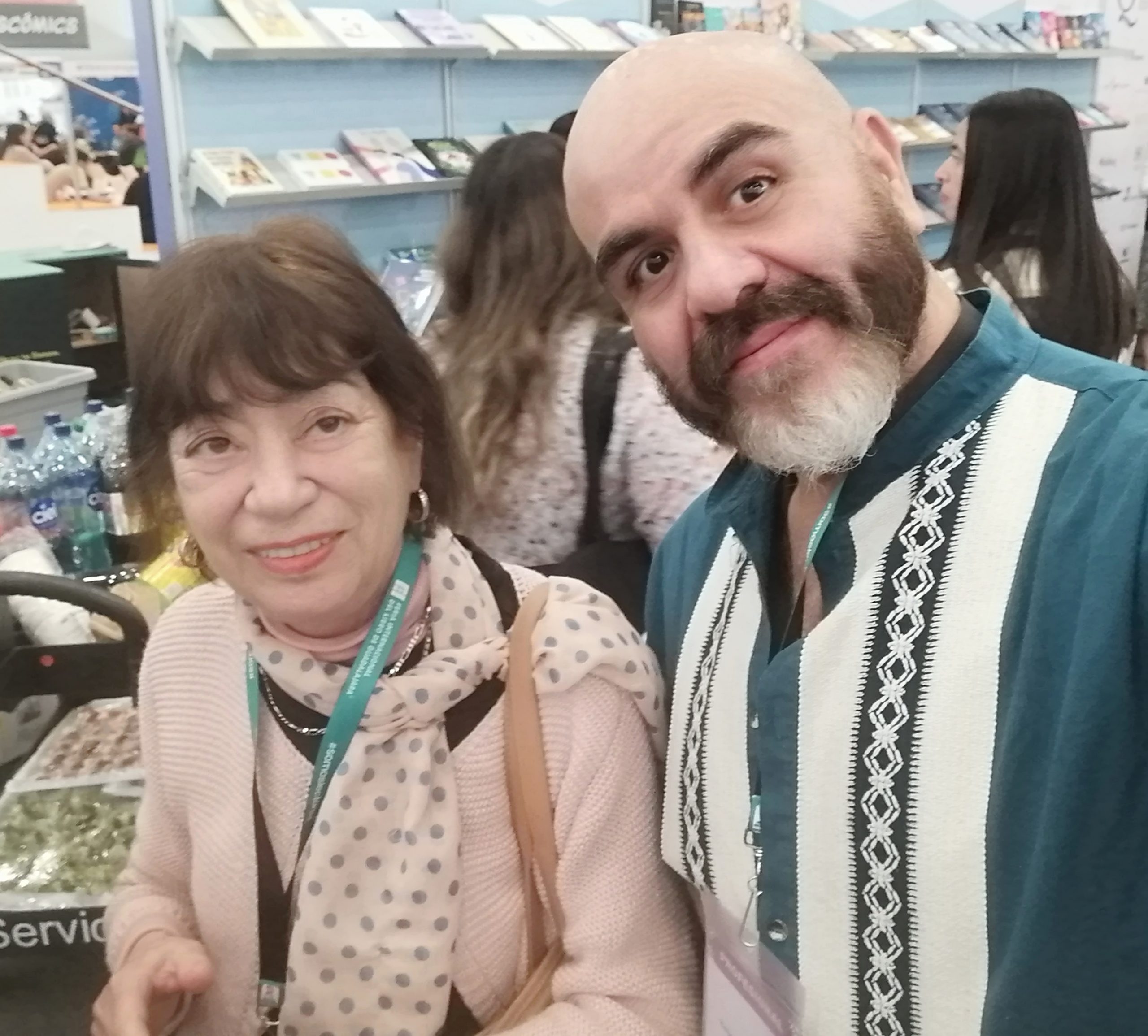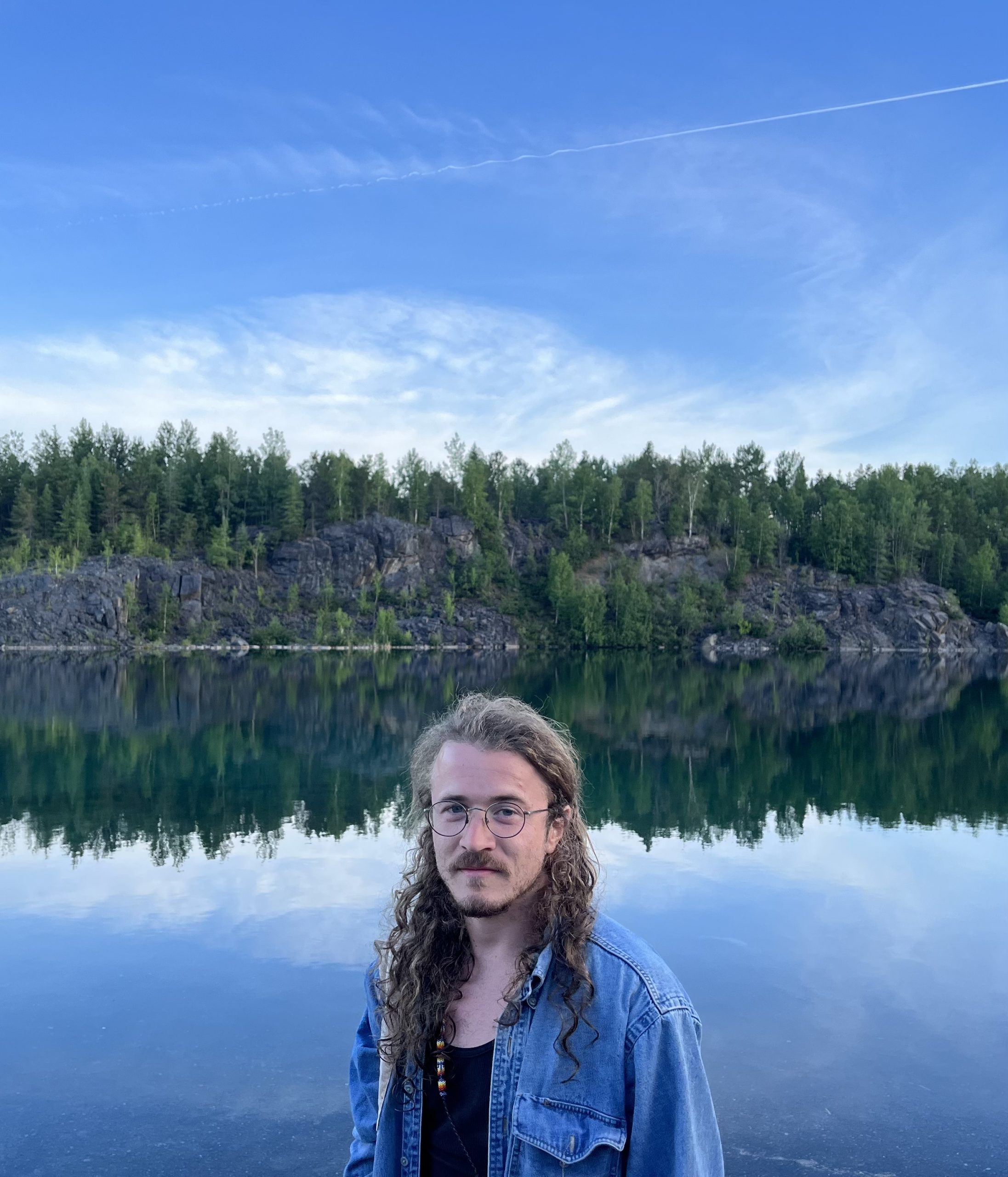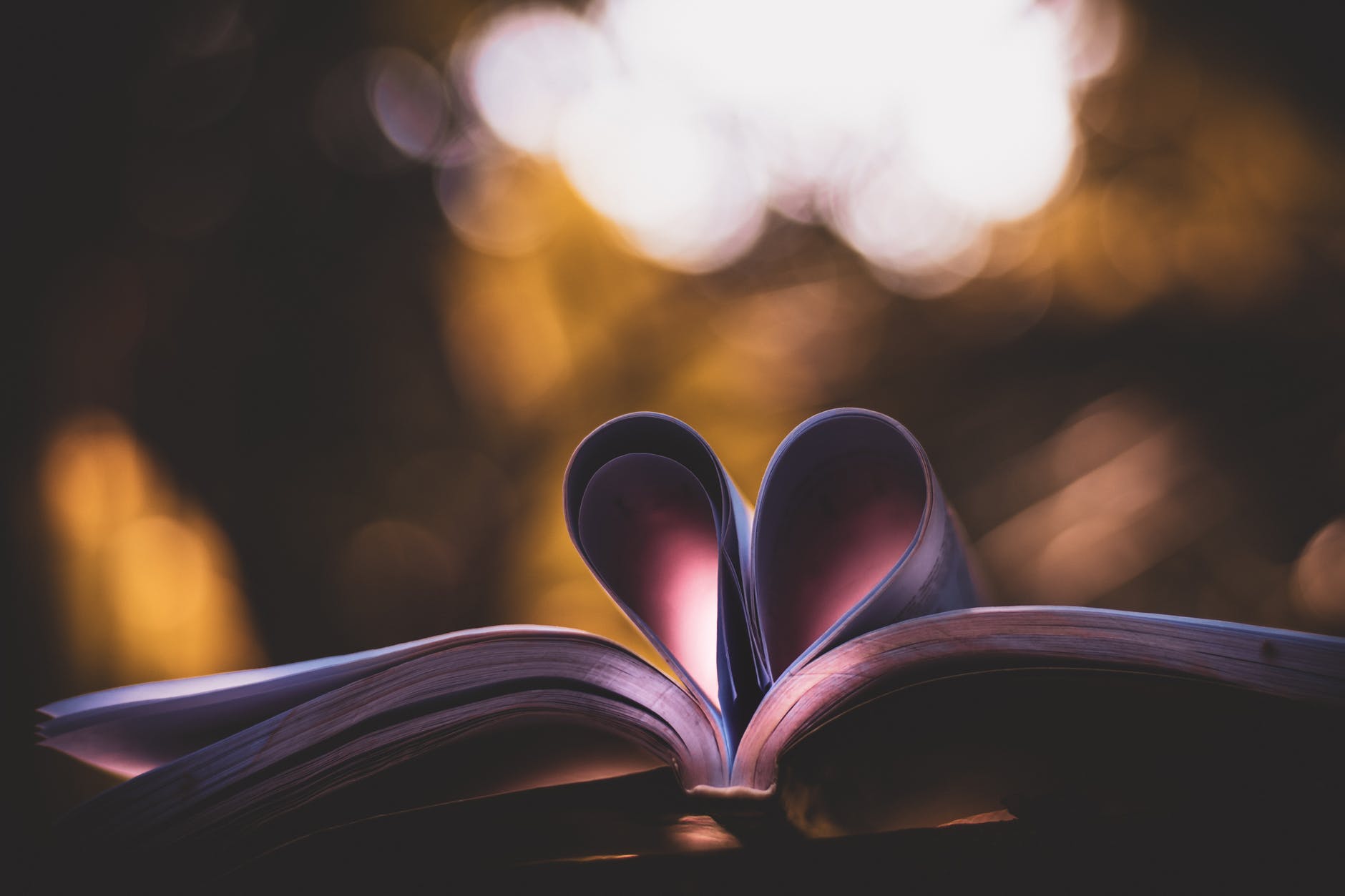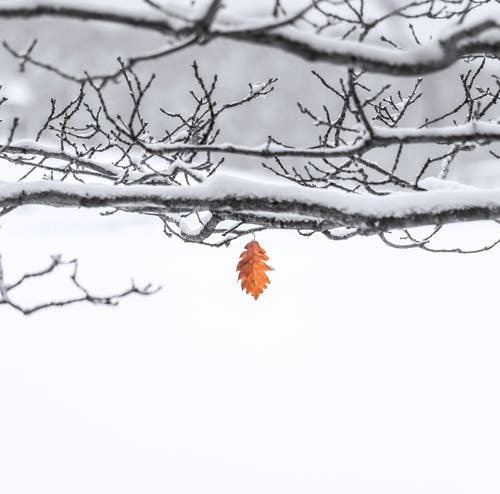Roberto Rueda Monreal, lauréat de la résidence de traduction littéraire ATTLC/MLQ à Québec, février 2023
La résidence de neige et de glace
Roberto Rueda Monreal
(Traducteur littéraire et auteur mexicain)
Texte traduit de l’espagnol par Hélène Rioux
À présent que je le vois, que j’y réfléchis, ma relation littéraire avec le Québec et avec Hélène Rioux a, d’entrée de jeu, frôlé l’irrationnel, l’inexplicable, avec les petites choses de la vie qui, en fin de compte, dans leur âme et leur essence, nous font grandir.
La première fois que j’ai entendu Hélène Rioux, il y a plus d’une décennie, elle donnait une conférence dans la ville de Mexico, la Gran Tenochtitlán et, sans savoir vraiment pourquoi, j’ai soudain éprouvé une révélation, comme un éclair aveuglant, et j’ai compris que je me trouvais devant une auteure dont, étonnamment, la proposition et le monde littéraires ressemblaient beaucoup aux miens. Tisser un roman sur la vie d’un tueur en série dont les victimes étaient de jeunes ingénues amoureuses de l’amour, sur une autobiographie dont la traduction serait réalisée par une traductrice spécialisée dans les romans à l’eau de rose, était une invitation à frôler l’obscurité, la cruauté, la méchanceté, tout cela de la main d’un être fait de pure naïveté, de pure lumière, mais tourmenté jusqu’au désespoir. La traductrice littéraire qui voulait s’approcher de l’abominable. Pourquoi ? Pour comprendre.
Un terrible oxymore pour affronter l’univers complexe de la traduction !
Par le passé, je m’étais familiarisé avec la littérature franco-canadienne et ma curiosité avait été piquée en constatant comment elle jouait avec la langue française, par sa façon particulière d’aborder les thèmes et les réalités, et j’avais envie de retourner expérimenter le frisson que provoquaient cette forme, cette âme, ce français particulier, cette fraîcheur exacerbée qui brûle parfois les entrailles, le bout des doigts, quelque chose de semblable à cette sensation que procurent la neige, le givre, la glace.
J’ai alors senti que Rioux représentait vraiment la littérature nord-américaine francophone et que la vie m’avait placé devant une occasion unique que je ne pouvais laisser passer. J’ai entrepris une lutte, un périple, un aller-retour, frappant aux portes de maisons d’édition mexicaines. Elles ne voulaient évidemment rien publier d’aussi étranger et bizarre qui, pour elles, ressemblait à quelque chose venu de France sans être français. La proposition d’une traduction littéraire d’un livre comme celui-ci et, surtout, d’une écrivaine-traductrice québécoise, semblait franchement vouée à l’échec.
Cela s’est poursuivi pendant quelques années et j’admets que j’ai été tenté de renoncer. Parce que j’avais beau reprendre des forces, perfectionner mon projet de traduction littéraire, les portes ne s’ouvraient tout simplement pas, aucune lumière ne s’allumait. Et pourtant, comme ça, et tout en étant totalement ignorant du monde des appuis institutionnels, je suis tombé sur une proposition recherchant un profil qui correspondait au mien.
À partir de l’acceptation du projet, des coïncidences lumineuses ont commencé à transformer le paysage. J’omets beaucoup de détails, mais je dirai seulement que Felipe Garrido, une autorité dans le domaine de la littérature au Mexique, éditeur en chef de la maison d’édition JUS, a reçu avec bienveillance l’auteur traducteur inconnu que j’étais, que nous avons pu discuter de ma proposition et de Traductora de sentimientos, ma traduction littéraire.
Garrido étant lui-même traducteur, il a su voir l’expertise, l’amour et la passion avec lesquels je relevais ce défi, un pari qui allait plus loin que le moment, que l’instant. J’ai compris que ce premier livre pourrait être le fer de lance des autres titres et que JUS pourrait bien publier toute une collection (ce qui me rendait fou de joie, mais qui n’a pu se réaliser), une collection consacrée à Rioux. J’ai su transmettre à Garrido cette étincelle originale.
À la suite de divers voyages, je suis parvenu à amener Rioux au Mexique. À Mexico, par l’entremise de JUS, et à Guadalajara (Foire internationale du livre), à quelques occasions, grâce à Publicaciones UNAM (Javier Martínez), puis avec l’aide de la Délégation générale du Québec au Mexique. C’est ainsi que j’ai naturellement eu le désir de me rendre au pays de mon auteure. J’ai fait plusieurs tentatives jusqu’au moment où, en 2022, j’ai posé ma candidature pour une résidence de traduction littéraire destinée à des traducteurs qui se consacraient à une œuvre d’écrivains du Québec.
L’Association des traductrices et traducteurs littéraires du Canada et la Maison de la littérature de Québec sont à l’origine de ce concours et j’ai été accepté. Après des épisodes de grand stress (tant à cause du climat qui m’attendait que parce que je suis très désemparé), j’ai eu le sentiment, à mon arrivée à la Maison de la littérature, d’accéder à quelque chose de vraiment important. La possibilité de travailler deux semaines dans une solitude presque totale et, en même temps, en compagnie de mon écrivaine, fut une promenade surréaliste : depuis le grand appartement où j’habitais je pouvais voir sans cesse tomber la neige, à l’occasion s’annoncer des tempêtes et j’ai parfois pu déambuler dans les rues de ce Québec-réfrigérateur.
J’ai trouvé très curieux de découvrir que si j’allais me promener (avant 17 heures, parce qu’après tout devient noir), je devais sans cesse regarder à mes pieds car à un certain point le neige se transforme en glace et l’expérience agréable peut devenir quelque chose de redoutable, de dangereux. C’est ainsi que les concepts de neige, de froid, de vent, de pluie, de température, de tempête, de grésil… ont acquis un nouveau sens, une nouvelle dimension qui, définitivement, ont perturbé plusieurs dimensions et processus de traduction du Bout du monde existe ailleurs (El Fin del Mundo existe en otro lado, le projet qui m’a conduit jusqu’à cette résidence). Évoquer la neige au Mexique, ce n’est pas comme la sentir s’écraser dans votre visage à Québec. Et pourtant, à la fin, toute l’expérience a été pure chaleur !
Je ne peux qu’exprimer ma reconnaissance à Dominique Decorme, Catherine Ego et Juliette Berton grâce à qui cette résidence a été rendue possible et, surtout, très agréable.
Et bien que, contrairement à Aureliano Buendía, je ne me suis pas retrouvé devant un peloton d’exécution, si García Márquez me le permet, je me rappellerai toujours ma résidence de traduction dans le Vieux Québec comme la première fois que la littérature d’Hélène Rioux a rendu mon visage plus rouge que jamais, m’a brûlé le bout des doigts, m’a fait me sentir trempé jusqu’aux os…. En parvenant à ce lieu historique directement de la Gran Tenochtitlán et de Montréal, j’ai réalisé quelque chose de plus significatif que la simple connaissance de la neige.
Alex Boos – Karin Montin LTAC/QWF Mentorship in French to English Literary Translation Program 2022
Several months ago, I was asked whether I would be interested in sharing thoughts on my experience as a mentee for the Karin Montin Literary Translation Mentorship (KMLT), a mentorship program that had been newly created by the Literary Translators Association of Canada (ATTLC/LTAC) in collaboration with the Quebec Writers Federation (QWF). I felt prepared to respond to this question with an unequivocal and affirmative “Yes.” This “Yes” was, of course, an assertion, an affirmation carrying the weight of an experience that I believe owed itself, and still owes itself, in large part to the mentorship program and the mentor with whom I was paired. On another level, this “Yes” was a way for me to pledge myself to the future and to the task of writing – and thus, I am writing at last, to say something, perhaps anything, about my experience. I say “anything” emphatically, because I could return a thousand times and more to the experience in question, whence my inclination to underscore that it cannot simply be synchronized, pinned down, dated – bref, codified into some chronology, from beginning to end, contained neatly in the past like a date on a calendar. And so, I decided to format this reflection by providing a few remarks on my experience as a mentee, circumstances permitting, and a sample of writing taken from a broader series of ruminations, reflections, and meditations on the translation process that I had put together over the course of the Mentorship itself.
I submitted my application and translation pitch to the KMLT in October, 2021. I was doubtful that my application would garner a response, and I am sure a great many aspiring translators, writers, artists, and young people in search of work, mentorship, and doorways into the world of the arts, may feel the grip of similar doubts. The arts suffers from a lack of resources, support, subsidizing, funding, and collective care that is in no small part due to a general trend in cultural and economic neoliberalization. Intensified competition and the scarcity of material supports and opportunities, whether in the arts or on the job market, have reached such heights that silence and doubt have quietly established themselves as a normative expectation in the social psyche, self-naturalizing as a general tone of the times. What perhaps compounded this mood of despair and sense of being a dice roll in a struggle against the odds, was the fact that I had chosen to pitch, from among all the literary genres of one’s choosing, a book of theory and experimental philosophy: La généalogie du déracinement: enquête sur l’habitation postcoloniale, authored by Dalie Giroux, a visionary Quebecois political philosopher and public intellectual. The task of doing justice to this work in summary is impossible – but if I were to provide a few descriptive remarks, I would say that it explores the contours of a collective imaginary and ways of living that render our relations to the Earth unintelligible, thereby producing an uninhabitable Earth. This Earthly uninhabitability is tied to the widespread rule of intellectual regimes of abstraction (state, value, capital, globalization, etc.,) organized around the production of value, which impinge on the material landscape. At the same time as it is an exploration or inquiry into hegemonic ways of living in North America, I would say it is also an exercise in what Derek R. Ford calls “fostering a collective imaginary beyond capital.” Its assessment of contemporary ways of living in North America in relation to global technocapitalism and the production of landscapes operates both as an elucidation of the historical present and as a kind of opening onto pathways towards liberating political futures. Anyhow, I had my doubts about receiving a response, and I had even more doubt about my chances of being shortlisted, let alone being offered the mentorship.
When I eventually did get a response, it was a response that – having in its nature broken the silence expected and dispelled doubt – I had not anticipated, but for new and separate reasons. The QWF wrote to inform me that I was among the top three finalists, but that I did not receive the mentorship. This was not, however, the crux of the surprise. Instead, what surprised me about the letter that I received was the sound of its heartbeat. I was informed that the translation mentor, Jessica Moore, made a request to obtain my contact information. In reply, I gave my permission to the QWF to pass my information onto her. Within a few weeks’ time, Jessica and I were exchanging emails. The fact that Jessica went out of her way to contact me and encourage me to pursue the translation project independently was already a sure sign that the official recipient of the mentorship was a very fortunate person. There are surely many facets that make a mentorship what it is, but at its foundation it is a relationship between people. And so, the sociability, encouragement, care, and enthusiasm that formed my first impressions of Jessica were indicative of a mentor who was passionate about and committed to the nature of their work. Our correspondence over emails culminated in a meeting over the phone, during which she generously shared her time, guidance, perspective, and thoughts. All of this transpired prior to the actual start date of the mentorship program between her and the recipient that had already been chosen. The decision on the part of the recipient to step down was the critical relational shift that would alter the course of our trajectories. Following that decision, the executive director of the Quebec Writers Federation contacted me to share the unexpected news and offered the mentorship program to me. I gladly accepted it.
My experience of the mentorship was so abundant, creative, and positively overwhelming that it spilled over into a photo-essay and sowed the seeds for ideas that I later developed and incorporated into a lecture on translation and linguistic materialism, which I gave to students enrolled in a fourth-year Contemporary Studies course at the University of King’s College in September, 2022. The combination of creative reflection and writing, assembling a philosophical term base, discussing the text, step-by-step editing and revising, patient and careful reading, applying the text to everyday life, exercises in meditation, and many other practices and approaches that were established throughout our mentor-mentee relationship as part of a translation process guided me towards unseen and previously unknown personal potentials for human creativity. The convictions that I previously held about the reciprocal bond between a flourishing creative spirit and the depth of a person’s humanity were restrengthened by this experience in such a way that the importance of mentorship programs is all the more clearly immeasurable. At least, these words are a personal testament to how profound of an impact the mentorship had on me, and the inheritance of which I continue to carry forward into new horizons. We need mentorships and we need them to multiply. With that said, I will close these last remarks with a small reflection on translation that I had written, among many others, over the course of my time as a mentee:
Bound to the radically contingent and irreducible alterity of languages, I am incapable, when translating, of a smooth reading. I am steeped in the microscopic and I feel inescapably compelled to read the French text line by line, each line again and again, to the point of sliding ever deeper into a space of solitude and disquiet with the French words. There is a sense of the eerie that takes hold, as though I reside in the pupil of an immutable, hidden, silent, and unknowable glance. Have I arrived at the threshold where the linearity of the phonetic alphabet, once described by Marshall McLuhan as the hot medium of typography for its abstract visual intensity, metamorphosizes into the ambiguous linings of language? Here, my assumed position as Reader further vacillates between Writer, Linguist and Artisan, caught in the restrictions, circumstances, syntaxes, letters, and boundaries of my own language. Reading a line over, and over again, in continuity with its flowerings in a new form, slipping into an atelier of experimentation and creation, in pursuit of a repetition worthy of eternal recurrence. I am somewhere between a junkyard, a workshop, an etymology, a dictionary, an archive, a discussion, a library, an office. Translation spreads a web of language, erects a variable and chaotic epistemological grid – an ever-widening clutter of notes and documents, new windows and tabs, an unfurling scroll of mobile texts and notes to self, post-its, colour-coding, underlining, momentary insights and reflections scrawled on the backs of opened envelopes. It has become unshakably clear to me that the placement of each letter, just as much as each and every word or comma, fastens and holds together the delicate structure of the text – that the materiality of each sign together creates an order of the possible and impossible. The feeling that you get when you believe that you may have determined the “right” placement, or the pleasurable experience of finding an order of words that feels “certain,” might be comparable to a kind of religious ecstasy. When what you are translating inhabits you and imbues your world, it can feel as indisputably true as some Sacred revelation. But, as Borges once wrote of the nature of a philosophical doctrine, it is “in the beginning a seemingly true description of the universe; as the years pass it becomes a mere chapter – if not a paragraph or a noun – in the history of philosophy.” On some level, translation is a striving to make such experiences of truth relivable.
***
Alex Boos lives and works in Sioux Lookout, Ontario, located within Treaty #3 and the Traditional Territory of the Ojibway of Lac Seul First Nation. He holds a B.A. Combined Honours degree in French and Contemporary Studies from the University of King’s College and Dalhousie University and an M.A. in Translation Studies from Concordia University. He is a freelance researcher and French-English translator, and a co-founder and co-host of the podcast Unsettling (formerly known as The Poplar Tapes), a podcast on history, culture, and politics striving after anti-capitalist and decolonial futures in the settler colonies. https://unsettling.podbean.com/
August 2022
Karen Simon nous fait part de la parution de A Mom, une traduction du livre pour enfants Une Maman de Mathieu Lavoie.
Genni Gunn has two new books to announce. Her poetry collection Accidents (Signature Editions) was recently featured on All Lit Up: Poetry in Motion and the book trailer can be viewed here. Her novel Tracing Iris was also translated into Italian by Margherita Piva, and published by Les Flaneurs Edizioni under the title Alla Ricerca di Iris. She looks forward to an Italian tour in the fall!
Émilie Laramée’s translation of Su J Sokol’s Cycling to Asylum, Les lignes invisibles, was published by VLB Imaginaire in June.
Sous la supervision de Louis Jolicoeur, le recueil de nouvelles Stations de Nick Mulgrew a été traduit par sept étudiantes du Département de langues, linguistique et traduction de l’Université Laval et publié chez les Éditions L’Instant même.
Book*hug recently published Remnants, Aleshia Jensen’s English translation of Céline Huyghebaert’s Governor General’s Literary Award-winning novel Le drap blanc.
Katia Grubisic’s translation A Knife in the Sky, originally published by Éditions du Remue-ménage in 2015 as Femmes au temps des carnassiers, was released by Inanna Publications in June. Watch Agnant introduce the translation and Grubisic read from the novel here.
On Thursday August 11, Elaine Kennedy will be launching Toronto, I Love You (Mawenzi House Publishers), her translation of Didier Leclair’s award-winning Toronto, je t’aime. The event will take place from 6pm to 8pm at Hart House at the University of Toronto in the Debates Room and will feature a conversation between the author, translator and special guest, writer Paul Savoie. RSVP here.
Spring 2022
- Petit essai en hommage au passé (A Small Esssay in Honour of the Past) de Tim Bowling, Le crachoir de Flaubert, le 18 novembre 2021. Le poème est tiré de Selected Poems, Nightwood Editions, 2013
- Dieu de l’Acceptation et Oignons, poèmes de Lorna Crozier, publiés dans Le récit-page, le 27 novembre 2021. Les poèmes sont tirés de God of shadows, 2018, McClelland & Stewart et The Garden Going on Without Us, 1985, McClelland & Stewart.
- et aussi, un article (Nicolas Bouvier et le Japon) : « Sur les sentes japonaises en compagnie de Nicolas Bouvier », Les carnets d’Eucharis 2021 [Sur les routes du monde, VOL. III), octobre 2021, pp. 7-13.
La dernière traduction d’Émilie Laramée, Rêves de drones et autres entropies, a récemment été lancée par le Groupe Nota Bene. De plus, Les libraires nous offrent un extrait sur leur site (une nouvelle complète).
Julien Besse nous fait part de la parution de Les Conséquences du capitalisme, de Noam Chomsky et Marv Waterstone, traduit de l’anglais, aux éditions Lux (Montréal), en septembre 2021.
Karine Mailhot-Sarrasin a le plaisir de vous annoncer que Les 400 coups viennent de publier sa traduction du livre jeunesse allemand “Meine Mutter, die Fee”. Les références à d’importantes oeuvres de la littérature allemandes ont représenté un défi très particulier dont elle est très fière d’avoir relevé! Plus de détails par ici.
July 2021
Congratulations to Georgette Leblanc and longstanding LTAC member Lazer Lederhendler for winning the 2021 Governor General’s Literary Awards for Translation. An amazing accomplishment by two wonderful translators! Leblanc takes the prize home for Océan, while Lederhendler’s If You Hear Me earns him his third bestowal of the award.
La production prolifique de Jean-Marcel Morlat se poursuit avec Le camarade de son père, L’Ampoule, que vous pouvez retrouver dans Hors-série no 9, 15 juin 2021, pp. 82-89, Bordeaux, Les éditions de l’Abat-jour. Traduction française de la nouvelle de l’écrivain australien Henry Lawson « His Father’s Mate ».
Members Katia Grubisic, Peter McCambridge, and Susan Ouriou will join fellow translator Rhoda Mullins and author Eric Dupont to participate in the final 2021 Giller Prize Master Panel, entitled “The Art of Translation.” The discussion will take place on Monday, August 9, at 7 p.m. EDT. Click here for more information.
Anne Malena and Sherry Simon each have essays included in The Routledge Handbook of Translation and the City, which was just published in late June 2021. From the book description: “Divided into four sections, the chapters are authored by leading scholars in translation studies, sociolinguistics, and literary and cultural criticism.They cover contexts from Brussels to Singapore and Melbourne to Cairo and topics from translation as resistance to translanguaging and urban design.”
In this interview with David Garyan, Beatriz Hausner discusses her career as a poet and a translator. “In some cases,” posits Hausner in the interview, “a translator’s work can have a profound effect on the trajectory of an entire literature.”
Spring 2021
Six, yes, SIX, of our members are finalists for the 2020 Governor General’s Literary Awards! Congratulations to Sophie Voillot, Daniel Grenier, Lazer Lederhendler, Sonya Malaborza, Arianne Des Rochers, and Pablo Strauss. Read more about all the finalists here.
Sylvie Nicolas souhaite présenter deux traductions récentes qui ont en commun la délicate conjugaison du verbe aimer à tous les temps:
- Mère(s) et monde, une traduction de (M)other de Sanita Fejzić.
D’abord écrit sous la forme d’un poème, finaliste en 2018 du CBC Poetry Prize, ce très beau texte de Sanita Fejzić raconte avec tendresse et justesse la difficulté des familles homoparentales à être acceptées pour ce qu’elles sont : des familles aimantes. Deux mères, un fils, et un monde rempli d’amour. La version originale anglaise et la traduction en français ont toutes deux été publiées aux Éditions Bouton d’or Acadie.
- Zee, de Su J. Sokol
Dans ce récit qui explore la différence, on découvre Zee qui, toute petite, démontre une empathie hors du commun et une étrange faculté extrasensorielle. Alors qu’elle grandit au sein d’un noyau familial non traditionnel, composé de quatre adultes très soudés, l’empathie et le don extrasensoriel grandissent avec elle. Un voyage au cœur d’un monde intérieur qui percute le monde extérieur. Quatre adultes aimants, une jeune à la frontière de l’adolescence et un monde peuplé d’embuches et d’amour. La version originale anglaise et la traduction en français ont toutes deux été publiées aux Éditions Mouton noir Acadie.
Leilei Chen will be hosting a panel literary translation at the upcoming Writers’ Guild of Alberta Annual Conference featuring Susan Ouriou and Peter Midgley. Learn more about the panel here.
Beatriz Hausner hosted the third edition of the successful Here is Elsewhere conversation series on April 26th. Beatriz welcomed Dr. Karl Jirgens and Mārta Ziemelis who both offered their expert insight on the translation of Latvian literature. Catch the recording of the discussion here.
Jean-Marcel Morlat a le plaisir de vous annoncer ses publications du mois de mars dans des revues françaises :
- Cinq poèmes de Patrick Lane (Octobre, Montagne blanche, La prison de Calgary, Le peu qu’il reste, Beauté (2000)), Europe, no 1103, « Jean Genet-Cédric Demangeot », mars 2020, pp. 273-275.
- Patrick Lane : quatre poèmes (Cariboo Winter, The Children of Bogotá, Mountain, Conversation with a Huang-Chou Poet), Les Cahiers de poésie (Collection dirigée par Joseph Ouaknine & Laurent Fels), Éditions Joseph Ouaknine, no 65 (mars 2021), pp. 77-86.
- Cinq poèmes de Michael Crummey (La loi de l’océan, La dernière chanson de Stan, Ainsi allait la vie, Les Brûlis, Années cinquante), Recours au poème, no 207, mars-avril 2021. Traduction française des textes de Michael Crummey, « The Law of the Ocean », « Stan’s Last Song », «The way Things Were », « The Burnt Woods », « Fifties », tirés du recueil Hard Light (Brick Books, 1998).
Les éditions Héliotrope ont publié en février Marécages de l’utopie, une traduction d’un roman de Catherine Fatima par Jeannot Clair. La parution a été célébrée le 2 mars dernier par une discussion à trois voix entre l’autrice, étudiante en traduction récemment installée à Montréal, la traductrice Daphné B., et le traducteur Jeannot Clair. La discussion est toujours disponible pour visionnage en ligne.
Sophie Voillot a eu la surprise de sa vie quand Donald Winkler lui a offert de traduire ses Anecdotes. I’m still pinching myself! Mis en ligne en français chaque dimanche depuis le début mars, les épisodes illustrés sont repris en version anglaise les jeudis, avec quelques semaines de décalage évidemment. Pour plus de renseignements sur ce projet : sovoillot.net/anecdotes/a-propos/
Par ailleurs, les éditions Alto viennent de publier en livre audio La fin de l’alphabet de C.S. Richardson, traduit par Sophie Voillot et lu par Michel Rivard, avec une trame sonore signée Noiserv. On peut lire les réflexions de M. Rivard ici, écouter un extrait du livre audio ici, ou se le procurer ici.
Julien Besse aimerait vous faire part de la parution de deux de ses plus récentes traductions :
- Jon Savage, Le reste n’était qu’obscurité. L’histoire orale de Joy Division, paru aux éditions Allia fin 2020;
- Theodore Roszak, La naissance d’une contre-culture, qui sera publié par les éditions La Lenteur ce printemps.
February 2021
Robert Paquin recently published at Quattro Books Le calendrier des vieux / An Old Man’s Calendar, an artistic, bilingual, illustrated calendar for the 12 months of the year 2021. Poems are by Robert Paquin, English translation is by Ray Ellenwood, both LTAC Honorary Members, and illustrations are by Montreal artist Peter Rochon. The calendar is sold for $10 + postal expenses. It may be ordered at info@quattroboks.ca or by writing to Robert Paquin directly at jarp@videotron.ca. For those who live in the Quebec City area, the calendar is also on sale at Librairie Chouinard, 1100, bd Guillaume-Couture, Lévis (Québec) G6W 5M6. Don’t miss the virtual launch soon to be announced here!
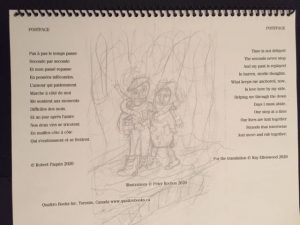
Beatriz Hausner interviewed author Pilar Quintana about her novel, The Bitch, and the subversive act of writing about the dark side of nature. The interview can be accessed here.
Phyllis Aronoff and Howard Scott are launching their latest translation, Edem Awumey’s Mina Among the Shadows, next week on Zoom. Click here for more details.
Dagger Editions just released The Fifth, Monica Meneghetti’s translation of MP Boisvert’s debut novel, Au 5e (La Mèche). The online launch is Feb. 27th. Click here for more information.
Catherine Ego a donné une entrevue sur Ces bombes qui fleurissent la nuit (Abu Bakr al Rabeeah / Winnie Yeung), sa traduction de Homes publiée cette année aux éditions du Boréal. Elle était en direct au micro de Jean-Paul Moreau sur les ondes de Radio Unique FM (Ottawa).
La traduction de Madeleine Stratford de Petits marronnages du poète Kaie Kellough est parue aux éditions du Boréal. Lisez une critique élogieuse du recueil de poésie ici.
Dans le cadre du cycle de conférence « Un traducteur rencontre son auteur », la traductrice et professeure de traduction Judith Woodsworth rencontre l’autrice Abla Farhoud le 24 février à 18h. Pour en savoir plus.
La traduction de Jean-Marcel Morlat de L’ancien Noël, un texte de Michael Crummey, est en ligne sur Le Crachoir de Flaubert.
Plusieurs de nos membres, dont Katia Grubisic, Lori Saint Martin, Paul Gagné, Elena Basile, Arianne Des Rochers, Simon Brown et plus encore, ont participé à des cabarets de traduction dans le cadre des Rencontres multilingues en poésie de La poésie partout. La série peut être visionnée dans son intégralité ici.
January 2021
The German translation of Arianna Dagnino’s The Afrikaner will be published by PalmArtPress (Berlin) in spring 2021. Italian and Arabic translations will follow in summer 2021. Read a short passage from the Afrikaner translated by Heddi Feilhauer:
“Die vereinzelten Straßenlampen verbreiten ein unstetes Licht, inihren kleinen, hellen Inseln enthüllt die Stadt ihre Blöße. Ausgestorben liegt das Stadtzentrum da, wie nachts fast immer.”
Leilei Chen’s term as LTAC’S VP West is off to a wonderful start! Collaborating with the Community Service Learning Office (CSL) of the University of Alberta in the fall semester of 2020, Leilei promoted the art of literary translation to the first-year students enrolled in the ENGL 102 A20/22/27 classes. Students were required to complete a minimum 20 hours of term work that included reading published essays and examples of literary translation, participating in the St. Jerome’s Day event, interviewing literary translators, and writing blog posts. Through collaborating with the university partner and educating entry-level students at the threshold of postsecondary education alongside serving our members, this initiative aims to expand the scale of promoting literary translation and to potentially grow our membership community in Western Canada.
Jean-Marcel Morlat, qui a connu une année 2020 très productive, a plusieurs nouvelles publications à annoncer :
- Grâce, Le crachoir de Flaubert, jeudi 13 août 2020. Traduction française de la nouvelle de Michael Crummey, « Grace », tirée du recueil Hard Light (Brick Books, 1998).
- Le polissage du halo, Sourdine, no 233 (automne, 4 septembre 2020), p. 35, Traduction française de la nouvelle de Suzanne Kamata «Polishing the Halo », parue dans The Beautiful One Has Come, 2011, Deadwood, Oregon, Wyatt-MacKenzie Publishing, pp. 167-177. Publication d’un extrait et de la nouvelle entière sur le site WEB d’Audition Québec.
- Le moment venu, Traversées no 96 (Été 2020), pp. 100-101. Traduction française du texte de Michael Crummey, « When The Time Came », tiré du recueil Hard Light, Brick Books.
- Synonymes du verbe “convoiter”, Le crachoir de Flaubert, jeudi 5 novembre 2020. Traduction française de la nouvelle de Sharon Bala « Synonyms of the verb “covet” », parue dans The Future, Issue 6, February 2010.
- Le tournoi de Sumô et Festivals japonais : le hatsumôde et le Namahage, textes d’Alan Booth tirés de Looking for the Lost: Journeys through a Vanishing Japan. Traversées, 19 novembre 2020.
- Ce dont nous avions besoin et Sa croix, Récit-page, 1er décembre 2020. Traduction française des textes de Michael Crummey « What We Needed » et « Her Mark », tirés du recueil Hard Light (Brick Books, 1998).
October 2020
Félicitations à Catherine Ego et Benoît Laflamme, finalistes du Prix de traduction 2020 de la Fondation Cole, remis par la Quebec Writers Federation ! Benoît est en nomination pour Éclipse électrique (Éditions du Boréal), sa traduction de The Knockoff Eclipse (Anvil Press) de Melissa Bull. Catherine est nominée à deux reprises. Sa première nomination est pour NoirEs sous surveillance. Esclavage, répression et violence d’État au Canada (Mémoire d’encrier), sa traduction de Policing Black Lives: State Violence in Canada from Slavery to the Present (Fernwood Publishing) de Robyn Maynard. Sa deuxième nomination est pour Zolitude (Éditions du Boréal), sa traduction de Zolitude (Biblioasis) de Paige Cooper.
*Mise à jour : Le Prix de la Traduction de la Fondation Cole a été remporté par Benoît Laflamme. Félicitations!
Madeleine Stratford‘s new translation, Swallowed (Véhicule Press) is launching on November 12 at 7 pm live on Facebook and Youtube. Tune in to watch Madeleine, Dmitri Nasrallah, and Steven W. Beattie discuss this new translation of Réjean Ducharme’s debut novel L’Avalée des avalés (Gallimard).
The fruit of Julia Jones’ labour at the 2019 Maison de la littérature translation residency, Wintering, was published in the October issue of Joyland. Click here to read an excerpt of Julia’s translation of Maude Deschênes-Pradet’s Hivernages.
La plus récente traduction de Nicolas Calvé, «Orwell, à sa guise. La vie et l’œuvre d’un esprit libre», de George Woodcock, est parue chez Lux éditeur. Extrait de la 4e de couverture: «Alors que George Orwell est remis au goût du jour tant à gauche qu’à droite, et que prolifèrent les fake news, la novlangue et de nouvelles formes de contrôle technoscientifique, cette biographie littéraire – la seule à avoir été écrite de première main – arrive à point nommé. Par l’élégance de son écriture et l’accès privilégié qu’il offre à son sujet, Woodcock brosse ici un portrait inédit de celui qui fut bien plus que l’auteur de la dystopie 1984.» Plus de détails ici.
Poésie Postale consacre sa 6e édition à la traduction littéraire et la traduction de Chantal Ringuet d’un poème de Rachel (Rokhl) Korn vient de paraître dans le cadre de ce projet. Plus de détails ici.
Jean-Pierre Pelletier vous invite à assister au lancement du prochain numéro de Possibles. L’événement aura lieu le 29 octobre, de 18h à 19h sur Zoom. Si vous souhaitez y assister, veuillez écrire à Jean-Pierre pour obtenir le mot de passe.
Genni Gunn‘s new collection of short stories, Permanent Tourists (Signature Editions) is launching on October 28 at 6pm CDT live on Facebook. Click here to RSVP for the event.
Félicitations à Lori Saint-Martin et Paul Gagné pour avoir remporté le Prix de traduction Jacob Isaac Segal 2020 pour Le Yiddish à l’usage des pirates (Boréal), leur traduction du roman de Gary Barwin Yiddish for Pirates (Random House). Lori et Paul partagent le prix avec Goldie Morgentaler, qui a reçu le prix pour sa traduction de Confessions of a Yiddish Writer (McGill-Queens UP) de Chava Rosenfarb. Le gala de remise des prix aura lieu le 12 novembre à 19h30 via Zoom. Cliquez ici pour vous inscrire.
Pablo Strauss launched Fauna (Coach House Books), his translation of Christiane Vadnais’s first work of fiction, which won the Horizons Imaginaires speculative fiction award, the City of Quebec book award, and was named one of 2018’s best books by Radio-Canada. Click here to view their discussion.

